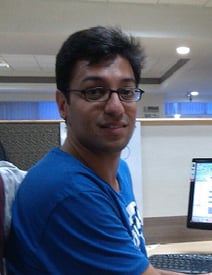Cytel data scientists apply advanced statistical techniques including predictive modeling of biological processes and drug interactions to unlock the potential of big data.
In this blog we talk to Munshi Imran, who is based in Pune, India to find out more about his career path, current role at Cytel and his interests outside of work.
 Have you always been passionate about software and did you know early on this would be your career choice?
Have you always been passionate about software and did you know early on this would be your career choice?
Not always. But after I joined Cytel, I grew to like the work - software development is intellectually challenging and I found it very satisfying. This is also largely because of good colleagues who made working in software development a pleasure.
One other thing that I have loved about developing products is that I am helping create intellectual property. I am building something that will potentially be used by many different customers (and in that sense has a much wider impact than something that is custom-built).
What is your current role?
I am working as a Senior Data Scientist on consulting assignments. This role involves using algorithms like machine learning to derive interesting and actionable insights from different sources of healthcare data. The work is very thought-provoking because of the unique challenges that each assignment brings.
How has your prior experience in software development prepared you for your current role as a Senior Data Scientist?
My years in software development have been immensely valuable in helping me perform my current role. Most importantly, I honed my coding skills as a developer while working on Cytel’s products. Apart from this, my experience in software testing has been very helpful in validation of the work we do in consulting.
The experience in planning and estimation of tasks is another skill that I learnt and this has stood me in good stead in my current role. I have also worked as SME/Analyst which involved discussing, analyzing, documenting requirements, and thinking from the user’s point of view.
I got the opportunity to hone varied skills in the software development team and this has helped me in gaining cross-functional experience and knowledge, which is helpful in my current role.
 A data scientist needs to be able to “transform” raw data into usable insights, how are you applying the data science methods to practical assignments?
A data scientist needs to be able to “transform” raw data into usable insights, how are you applying the data science methods to practical assignments?
The road from raw data to usable insights is long and challenging. As data scientists, we spend considerable amount of time cleaning and processing the data to put it in a form that is amenable for use with statistical and other learning algorithms.
We do some exploratory analysis in which we create basic plots and tables to understand basic patterns in the data and presence of noise. This helps to inform the direction of further analysis. We use some of the standard classification algorithms for classifying signals as being generated from normal or impaired physiological function. We have also used unsupervised learning methods to identify biomarkers that can be used as predictors for disease condition.
Lastly, the results obtained from our analysis have to be communicated to stakeholders. The challenge is that, in many cases, stakeholders are not very aware of the data science methods. So the results have to be communicated to them in a simple way, ensuring that the findings match with the biological hypothesis and interpretations. This requires good understanding of the use case and effective communication skills.
What most inspires you about working in this field?
Working in the domain of clinical trials is satisfying because our work helps to bring out new treatments for diseases. The data science field is buzzing with activity and it requires one to keep continually learning. Consequently, there is little scope to feel stagnated.
What would be your three top tips for early career data scientist looking to develop in this field?
1. Brush up on your math skills – A career in data science requires one to have good knowledge of topics like probability and statistics, calculus and linear algebra. Without a knowledge of these, it is difficult to understand the inner workings of machine learning algorithms.
2. Work on your logic and coding skills – Good logical thinking is important for devising algorithms and good coding skills are important for implementing software programs for data science.
3. Be willing to learn – The field of data science is developing rapidly. The will to learn is necessary to help stay abreast of the latest algorithms, programming frameworks and applications.
What are your personal values?
Respect for the work of team members. Understand the value of knowledge and therefore the importance of continuous learning and development
What are your main interests outside of work?
I really enjoy reading, and feel this activity brings me new ideas and makes my thought process more articulate.
 .
.
Thank you for taking the time to talk to us and sharing your journey.
Careers
Cytel biostatisticians and programmers are active and well regarded in industry associations and communities around the world. Would you like to join our talented team? We have roles for biostatisticians, statistical programmers, and data managers at all levels across our global locations. To find out more about rewarding careers with us click below.




 Have you always been passionate about software and did you know early on this would be your career choice?
Have you always been passionate about software and did you know early on this would be your career choice? 

